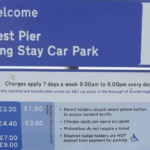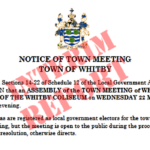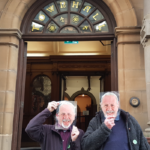“A Breath of Fresh AIRE“
A Letter to the Editor by IAN LOWNDES, from Derbyshire, writing in response to the “Whitby Abbey Aire“ initiative launched by campaigner ANDY STRANGEWAY and Enquirer stalwart NIGEL WARD, promoting a winter off-season facility for motorhomes in the immediate environs of Whitby Abbey, through the good auspices of former Councillor SANDRA TURNER, local businesses and local government movers and shakers. Mr LOWNDES’ Letter was also emailed to selected Scarborough Borough Councillors.
~~~~~
Sir,
Motorhome Parking in Whitby
I write to you to offer congratulations and support in respect of the letter written by Sandra Turner as reported in North Yorks Enquirer June 17 2020 and wholeheartedly endorsed by local business interests in Whitby. This proposes provision of parking facilities in winter for motorhomes in Whitby.
I am a motorhomer, a retired architect, and member of a forum of responsible motorhome owners which includes members, largely retired, from many professions and walks of life. I and most of our members have been deliberately bypassing Whitby in recent years as a result of the Council’s hostile attitude towards motorhomers. It is a shame, as I and others would like to visit. (My own attempts to visit have been primarily in winter when I found most campsites closed, and the few that were open unable to take a motorhome due to soft ground conditions. I ended up stranded in a remote rural farm with no public transport to Whitby, and left the next day without visiting.)
I have to say, with regret, that this proposal appears only to be a knee-jerk reaction to the current devastating loss of tourist business in the town. A proper sustainable long term strategy is required that addresses the all-year-round demand for overnight stop facilities in England for the more than 250,000 UK motorhome owners and many thousands of visiting Europeans, not just in winter.
I have taken the liberty, in the hope that it might be helpful to you, of putting together below a brief summary of what I believe to be the current state of affairs concerning touring motorhomes in England. I am aware many involved in making decisions about facilities for motorhomers actually have very little knowledge of the issues that concern them.
I sincerely hope you will be able to make some progress with this issue as the situation in general is deteriorating at an increasing rate.
Types of motorhome user
Motorhome users are by no means a homogenous group. Although dismissed as such by the uninformed, motorhomers are not gypsies, tinkers or new age travellers and should not be treated as such. Those groups have their own needs and issues that should be addressed quite separately.
The main categories are…
Families with children who spend an occasional one- or two-week holiday involving camping gear, barbecues, toys and children’s activities which need a safe and secure environment, along with full sanitary facilities all of which are best provided by campsites.
Weekenders taking a break who are largely self contained for a few days. They travel mostly spring to autumn. They want close access to outdoor activities, towns and villages. They frequently eat out and shop and are happy to pay for local services and restaurants provided there is available parking for motorhomes or access on foot.
Older people collectively account for the largest number of nights spent in motorhomes. Retired people are free to travel all year round, including winter, and may take extended tours of weeks or months in duration. Their limited budgets are necessarily spread over long periods. They need to and willingly spend in local shops, restaurants and attractions but simply can’t afford to do so if they must spend £25 to £40 a night on campsites. The motorhome is an ideal way for older people to spend their last days visiting so many of those places they never had time or opportunity to see in their working lives. Many of these people have significant disabilities and medical issues that render a motorhome their ideal or only viable means of transport or holiday accommodation (especially now).
A smaller number of younger people seeking the experience of travelling, sometimes as a ‘year out’, often from abroad, usually travelling on limited budgets and who can only afford occasional use of campsites.
European motorhomers arrive in their thousands, mostly in holiday periods but with many retired people able to travel longer term and off season. Many arrive expecting to find facilities for motorhomes like at home, and are greatly disappointed when they find no motorhome stops or service facilities, and discover campsites solidly booked all summer. Often they can’t even find anywhere to park a motorhome to visit towns. I have personally spoken to quite a number in France, Germany and Italy who say that despite liking the country they would never return because of the lack of facilities and the general hostility of local authorities; albeit some have said they would be happy to revisit Scotland where they feel welcome if it didn’t mean travelling through England.
The nature of motorhome travel
The attraction of the motorhome is that it offers the opportunity of unscheduled exploration of town and country, at home and abroad, and the opportunity to stop in wild remote places. The modern motorhome offers a self contained environment complete with on-board water, sanitation, and waste storage, and even solar power. Their basic need is for no more than somewhere to park, access to a water tap, a bin and waste disposal point once every 3-6 days.
A growing problem
There have been motorhomers quietly moving around for many years, parking innocuously in quiet corners, lay-bys and carparks troubling nobody and largely unnoticed and accepted. However in the last two decades numbers have increased enormously, a vigorous industry has burgeoned manufacturing and trading motorhomes, and more recently hire companies have sprung up releasing droves of inexperienced motorhomers onto the roads.
Behaviour of motorhomers.
Sadly there is no umbrella organisation representing motorhomers interests. There are however a number of groups or forums to which a large proportion of regular motorhomers belong. These forums encourage a code of conduct which basically is:
- Be quiet, discrete and courteous, avoid inconveniencing local residents.
- Put nothing outside, take nothing but photos and memories, leave nothing behind.
- Dispose of waste responsibly.
- Where possible, spend locally and support local businesses.
- Don’t arrive in large numbers or overstay your welcome.
Motorhomers are frequently berated as a whole for what are the actions of a relatively tiny minority. I can say emphatically I have never discharged black waste inappropriately, left rubbish, invaded private land, or stayed close to or obstructed residential property, and would have strong words for those who do. Indeed, in common with many of my fellow motorhomers, I frequently pick up the rubbish left by car occupants in locations where I stay, and leave such facilities as I use in a far cleaner state than they were when I arrived.
Although I have never seen it personally it would be unrealistic to believe there doesn’t exist a minority whose behaviour causes concern. The release onto the road in recent years of a flood of inexperienced hirers without adequate instruction is something that may well need scrutiny. Nevertheless there is a well established principle in British jurisprudence that groups or categories of people cannot be penalised for the actions of a few.
The UK’s response to motorhomes
Unlike their counterparts abroad local authorities in the UK have reacted to motorhomers as a group with blatant hostility. ‘No camping’, ‘No overnight parking’ and other signs have proliferated, many illegal and unenforceable, others misusing powers under PSPOs and TROs intended for other purposes. Height barriers have sprung up making it impossible even to park short term. Too many have simply tried to move the problem down the road creating a more intense problem in the next Borough. Left hands are out of co-ordination with right hands, Tourist organisations are encouraging visitors, Councils are driving them away.
Many of these measures by councils have been driven by urban myths and complaints manufactured by vested interests.
Campsite owners bewail the loss of trade. With due respect many motorhomers would rather go elsewhere than pay for the large pitches, toilet blocks, play facilities, activity rooms, reception offices and maintenance staff appropriate to caravans and tents but that self contained motorhomes simply do not need or want.
Hoteliers and B&B proprietors object to loss of trade. There is no way motorhomers would want a hotel, that is trade they have already lost and will not see again. What their objections achieve is to deprive other businesses, restaurants, shops, pubs and attractions in their vicinity the footfall that would otherwise come from motorhomers.
Many of the complaints by locals claimed by councils appear to be exaggerated or fictitious. Of the thousand alleged by the council at Whitby, for example, following a Public Request for Information in August 2018 only three could be substantiated and of them two appeared to derive from the same person.
Only a precious few authorities such as Canterbury, Fyfe, and Fylde have actually started to address the need to manage motorhome numbers in a enlightened, constructive and much appreciated manner that encourages motorhome tourists to visit their towns whilst managing numbers and providing appropriate facilities.
The two main UK caravan and camping clubs, historically dominated by caravaners and tenters, whilst welcoming subscriptions from motorhome members have doggedly resisted providing or supporting the case for basic sites and facilities suitable for motorhomes. Many campsites located to suit the need for people in cars are inconvenient for motorhome users who need to be able walk or cycle into towns or villages where motorhome parking is impractical. Most will not allow non-resident motorhomes to access or pay for use of their dump stations or water.
Outdated Regulations concerning Planning and Campsites conceived when tents and caravans were the only options available continue to hinder progress, or are invoked as an excuse for doing nothing.
Other nations’ response to motorhomes
Local Authorities, caravan and motorhome Clubs, and private interests throughout continental Europe (and even New Zealand, Australia, America and Canada) have responded by welcoming motorhomes and providing many tens of thousands of dedicated parking locations for motorhomes (variously called Aires de Service, Aree di Sosta, Wohnmobile Stellplatz etc. according to country). These may range from places where motorhomes are simply tolerated, designated spaces in carparks, dedicated motorhome-only parks, up to some like basic mini-campsites. Some use overnight capacity of otherwise empty carparks to gain extra revenue from motorhomes. Many restaurants, bars, cafes, attractions, nature reserves, historic sites, farms, vineyards, and LA swimming pool and leisure centres provide overnight stay for motorhomes.
Subject to type and quality, the degree to which it is desired to attract or limit visitors, and the popularity of the location, prices charged range normally from 5 to 15 euros, albeit many basic parking sites are free. Payment is usually by cash or card using automat or parking machine. Recognising that motorhomes do not need services every day, water and sanitation are normally separately charged. Sanitation is normally free to encourage proper disposal with a charge of 1 or 2 euros for fresh water. In respect of the increase in motorhome use many campsites now include a basic low cost overnight motorhome parking and service facility, encouraged by local authorities they also permit paid access to services by non-resident motorhomes.
In some countries, typically New Zealand and Scandinavia but also some in France, separate ‘dump stations’ are provided at garages, LA facilities, local sewage plants etc. to obviate the need for facilities at individual parking areas. Service points range from a simple tap with grid and hinged manhole, through custom built sanitary stations, to factory-made and sometimes franchised coin or card operated service columns.
In most countries motorhome Aires are provided under parking regulation and not regarded as campsites. Hence it is made clear that these locations are intended for self contained motorhomes with their own water and waste holding tanks, not caravans, tents or small campers. ‘Camping behaviour’ is forbidden including the placing outside of awnings, chairs, tables, barbecues and other camping paraphernalia. Periods of stay are normally limited to 48 or 72 hours. I am not aware of any such provisions that have ever been overrun by ‘Travellers’.
Covid 19 . . . It can only get worse
Every year, many thousands of motorhomers wanting to explore foreign parts, or simply like myself, to get away from a country where they feel unwelcome and escape abroad across the channel. Their numbers probably significantly outweigh the number of incoming European motorhomes. Thanks to the pandemic many of these Brits will be staying at home this year and much of next. One further impact of Covid 19 is a massive increase reported by dealers in the last few weeks in motorhome sales. After all the motorhome is now the only available safe self-isolated form of transport available. Thus lots more new inexperienced motorhomers will be out on the road. Many campsites are already mostly fully booked for July and August, even though they are not even yet open. The problem gets ever bigger, whilst properly thought-out means to address it seem to be as far away as ever, and will remain so as long as the majority of local authorities continue to bury their heads in the sand.
I hope this has been helpful. I, and others of our motor-homing community, would be happy to provide further information and discuss any questions you may have. I have tried not to include too much detail lest this mail became even longer.
Yours faithfully
Ian Lowndes
(Derbyshire)



























Comments are closed.